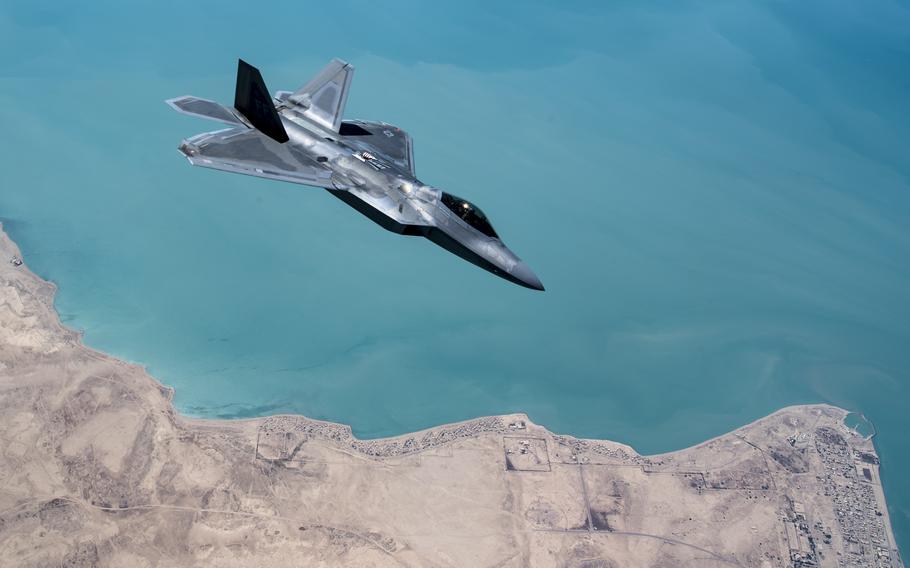
A U.S. F-22 Raptor conducts a combat air patrol mission over an undisclosed location in the Middle East in 2019. On June 14, 2023, U.S. Central Command said F-22s have been deployed to the Middle East following unprofessional actions by Russia's air force in Syria. (Russ Scalf/U.S. Air Force)
The U.S. military has deployed F-22 Raptor fighter jets to the Middle East, following months of complaints that Russian aircraft have been buzzing U.S. bases in Syria and violating protocols developed to prevent fighting between American and Russian forces.
The deployment of Raptors flown by the 94th Fighter Squadron out of Langley Air Force Base, Va., comes in response to “increasingly unsafe and unprofessional behavior by Russian aircraft in the region,” a statement Wednesday by U.S. Central Command said.
“Their regular violation of agreed upon airspace deconfliction measures increases the risk of escalation or miscalculation," Gen. Michael "Erik" Kurilla, the commander of CENTCOM, said in the statement.
Since late February, fighter jets and surveillance drones from Russia have been flying regularly above U.S. positions in Syria and sometimes have attempted to goad American pilots into dogfights, U.S. generals have said.
“They're not operating like a professional air force anymore,” Lt. Gen. Alexus Grynkewich, head of U.S. Air Forces Central, told Stars and Stripes in an interview last week.
Some of the Russian planes were carrying air-to-ground weapons as they flew over U.S. bases and all were equipped with sensors that most likely are used to gather information on U.S. positions, Grynkewich said.
Some 900 U.S. troops are deployed to Syria in a mission focused on opposing the Islamic State group.
Russian forces are also in Syria, where they back the government of President Bashar Assad.
While Russian and U.S. forces in Syria have both declared the need to defeat ISIS, their backing of opposing Syrian groups has led to deconfliction protocols meant to avoid a direct conflict that could lead to a larger war.
“Our No. 1 objective is of course to protect our troops, but close behind it is to avoid escalation,” Grynkewich said last week.
A statement in May by U.S. Air Forces Central said the deconfliction protocols include agreements on areas where the U.S. and Russia have agreed to notify each other prior to transiting. They also include details on standoff distances from aircraft and ground forces, and an agreement not to conduct armed overflights of ground forces.
In May, the U.S. accused Russia of 85 protocol violations since March 1. Of those, 26 were armed overflights.
Russian military leaders, meanwhile, accuse U.S. pilots of violating agreements that separate Syria’s airspace, the Saudi Arabia-based Al Arabiya English reported June 1.
Grynkewich said last week that Russian leaders have not been receptive to U.S. complaints recently.
“They're not reciprocating as they used to, so deconfliction doesn't work,” Grynkewich said. “Then your next best bet is to make sure that you're in a position to defend yourself.”